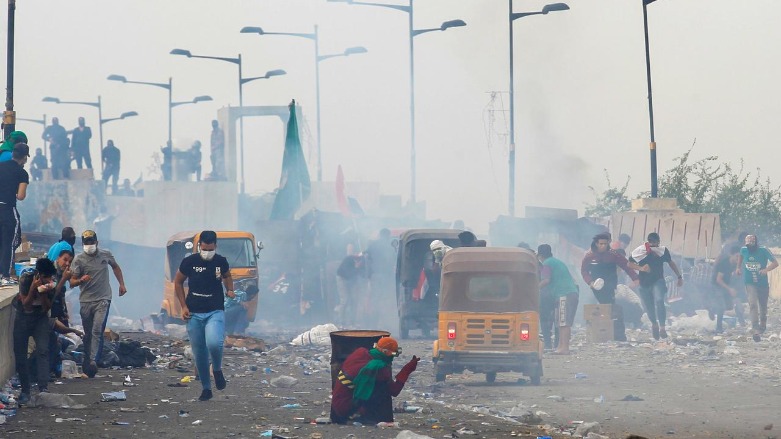Amid Iraqi protests, Kurdish leader, national security chief stress reform

ERBIL (Kurdistan 24) – Senior Kurdish leader Masoud Barzani met on Sunday with Iraqi National Security Advisor Falih al-Fayyadh in Erbil to discuss the nation's current political and security climate amid ongoing deadly protests in central and southern Iraq.
The two sides expressed their continued support for the government of Iraqi Prime Minister Adil Abdul Mahdi. Protesters have called for his resignation, as well as his cabinet, as the newest wave of violence-ridden protests continued for the third day in a row in all major cities in Iraq with the exception of those in the Kurdistan Region.
Barzani is head of the Kurdistan Democratic Party (KDP) and former president of the Kurdistan Region. Along with his role as the national security advisor, Fayyadh is also the chairman of the Iranian-backed Popular Mobilization Forces (PMF) militias.
The two stressed the urgent need for reform, for anti-corruption measures, and for an adequate governmental response to the "legitimate" demands of protesters, echoing dozens of similar statements by officials that Iraqis have gotten used to hearing whenever public unrest mounts.

Crowds took to the streets in Baghdad and then in several other cities in early October for approximately a week, during which close to 140 were killed—mostly protesters, as the security forces responded violently to disperse and deter demonstrations, including the use of live rounds.
In the days following the first surge of protests, Abdul Mahdi made promises of reform and a cabinet shuffle, but protesters viewed the response as insufficient and returned to the streets again on Friday. While demonstrations were initially peaceful, they quickly turned violent as the security forces responded with a confrontational show of force. Demonstrators also upped the ante, torching dozens of government buildings and political party offices.
Read More: Iraq protests: Security forces kill 3 and wound 84 in Baghdad, arrest 25 in Basra
On Sunday, Abdul Mahdi ordered the elite Counter-Terrorism Service to deploy in the streets of Baghdad in purported efforts to protect important state buildings as other security forces worked to control the throngs of angry citizens that poured into public spaces.
Read More: Iraq deploys elite counter-terrorism force to end Baghdad protests
Reuters quoted anonymous security sources in Iraq on Saturday, who said the elite forces had been informed to “use all necessary measures” to stop the demonstrations.
On Saturday, one of the largest parties in the national parliament announced it would be moving to the legislature’s opposition, urging other factions to follow suit in order to force the passage of national reforms.
Editing by John J. Catherine
